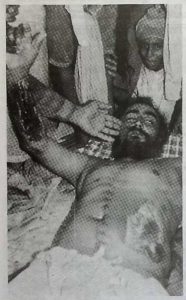
Summit Sen reports in the States man India’s leading daily:
Amnesty International, in its latest report on deaths in custody and “disappearances” in Punjab has accused the Punjab Police of gross human rights violations.
There have been persistent allegations about the killing of militants and their relatives in police custody in Punjab. But according to projections by the Punjab Po lice, such killings are the result of “encounters” between militants and the police, the Amnesty International report says,
Quoting media reports in Punjab, Amnesty says 266 persons, de scribing by the police as militants, have been killed in 169 “encounters” since early this year.
But in many cases, marks on their bodies showed that they had been killed in 169 “encounters” since early this year.
But in many cases, marks on their bodies showed that they had been killed in custody by the police, the report says.
Faced with mounting complaints of human rights violations by the Punjab Police, K.P.S.Gill, the Director General, had earlier announced that there would be a review of the police force to “‘en sure professionalism and to re move aberrant behavior.”
This was supposed to follow an investigation of suspected police excesses by 400 Punjab Police personnel, But later, the Punjab chief minister, Beant Singh, re versed the decision since “any such move could hamper antiterrorist operations.”
Describing this as “regrettable,” Amnesty International says unless the Center takes action to impartially and effectively investigate alleged human rights violations, the persistent pattern of grave violations in Punjab will never come to an end.
Quoting a report which appeared in The Statesman on April 20 this year, Amnesty says Gulshan Singh, a resident of Amit Vihar in Delhi, was picked up by Punjab Police personnel who took him to Amritsar for interrogation in connection with a case there.
His whereabouts are still unknown.
Witnesses told Amnesty that they heard Gulshan Singh shout before being gagged. He was taken away in a van by a group of people on April 3,1993. Gulshan Singh had been earlier charged with a bomb attack on Jagdish Tytler, union minister for surface transport. But he was later released on bail.
Referring to the case of Umrao Singh who was arrested in Delhi on April 1,1993, and handed over to Punjab Police on April’ 7,1993, Amnesty International fears that he may have been tortured or killed in police custody.
According to the Amnesty International report, one of the most flagrant violations of human rights in Punjab relates to the killing of Ayiar Singh, an independent candidate in the postponed Punjab State Assembly elections and a resident of Shatran a village in Patiala district who was caught by the police on July 25,1991.
Three persons reportedly told the Punjab Human Rights Group, 4 local civil liberties organization, on condition of anonymity that they had’ witnessed “extremely brutal and inhuman torture of Avtar Singh” on Aug.5, while he was in police custody, a day before he was killed.
Though Avtar Singh had been actually arrested on July 25,1991, the Punjab Government informed Amnesty that the had been arrested on Aug.6,1991.
The Government claimed that his body was handed over to the family, but his wife said it was discovered in the back of a police vehicle by a crowd,
Amnesty International has taken photographs of Avtar Singh’s body which shows signs of torture. These have been analyzed by an independent forensic pathologist who found “marks on the soles of the feet consistent with the application of heated instrument.” An Amnesty International delegation visiting Delhi in Nov.1992 urged the Indian Government to conduct a thorough inquiry. But till recently nothing has been done.
Another such case relates to the alleged death of Gurdey Singh Kaonke, a 44year old high priest of the Akal Takht, in police custody on January 3,1993.
The new Army Chief of Staff, General B.C Joshi, in his first public statement on assumption of duty, stressed that Army person newshound give “more importance” to respecting Human Rights while undertaking low intensity operations. While it was the duty of the security forces, including the army, to act and use force against militants, the “intricate nuances of Human Rights must be fully understood by officers and jawans,” General Joshi stated.
Article extracted from this publication >> November 5, 1993